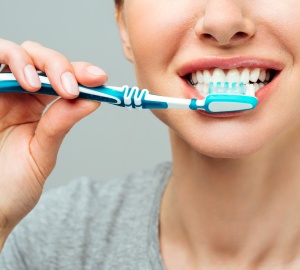
Exploring the oral microbiome and blood pressure connection
Dr Raul Bescos is an Associate Professor of Human Nutrition and Physiology at the University of Plymouth, and a member of the University’s oral microbiome research group. The group works in collaboration with colleagues at the Dental School to understand the connection between nitrite-producing species (NPS) within the oral microbiome and blood pressure regulation via nitrous oxide, and whether overall oral health has an impact on the NPS present.
Investigating the effects of propolis and chlorhexidine mouthwash
The group’s recent publication “The comparative effect of propolis and chlorhexidine mouthwash on oral nitrite-producing bacteria and blood pressure regulation”, investigated and compared the effects of chlorhexidine mouthwash (CHX-M) and propolis mouthwash (PROP-M) on parameters such as relative abundance of NPS, nitrogen-producing activity (NPA), plasma nitrate levels and systolic blood pressure.
Chlorhexidine: a double-edged sword for oral health
Chlorhexidine has strong antibacterial properties and has been used in dentistry for years due to its ability to inhibit pathogenic bacteria. However, recent evidence suggests this inhibitory activity can reduce the number of nitrite-producing species within the oral microbiome, which are important for maintaining salivary pH and metabolising lactic acid as a carbon source during denitrification. Oral nitrite is swallowed and converted to nitrous oxide (NO) in the stomach, a conversion associated with blood pressure reduction. The inhibition of NPA by chlorhexidine has been shown to be linked to an increase in blood pressure in some studies, as well as acidification of the oral environment.
Propolis: a natural alternative with potential benefits
Propolis has been shown to have similar antibacterial properties as chlorhexidine, due to it being a source of flavonoids and phenolic compounds with antimicrobial properties. In previous studies it was shown to reduce blood pressure in rats and hypertensive individuals, potentially caused by the upregulation of endothelial NO synthase. Studies in rodents also highlighted positive effects on the gut microbiome after dietary supplementation with propolis. Due to these apparent advantages of propolis over chlorhexidine, Dr Bescos and his group decided to investigate the impact of propolis on the oral microbiome, and if using it as a mouthwash can have the same impact on blood pressure as observed in previous studies when it was ingested.
Study design: how the research was conducted
The present study aimed to characterise the impact of both mouth rinses on NPS, NPA and blood pressure in healthy individuals. Forty-five participants were randomised into 2 groups to rinse their mouth twice a day for seven days with either CHX-M (n = 21) or PROP-M (n = 24). Metagenomic sequencing (16S rRNA) was performed on saliva samples collected before and after each treatment. Additionally, salivary biomarkers and blood pressure were measured.
Optimising DNA extraction for microbiome analysis with the ZymoBIOMICS range
When studying the microbiome, a DNA extraction kit that reduces bias for easy-to-lyse organisms is key for full representation of the species present and accurate results. Dr Bescos was recommended the ZymoBIOMICS 96 MagBead DNA kit by some colleagues who had used it in the past. The kit is designed for unbiased DNA extraction from samples such as faeces, soil, water, biofilms, and saliva. In this case, the user-friendly protocol and the uniform extraction from saliva provided excellent DNA yields, with no samples discarded due to poor quality. The extracted DNA was subjected to library preparation for downstream sequencing.
Key findings: how mouthwash choice affects NPS and blood pressure
The sequencing data obtained showed that NPA was similar in both groups at baseline, with a significant reduction observed in the CHX-M group after treatment compared with baseline and PROP-M. Despite this drop on NPA, the CHX-M group displayed a relative increase in NPS. This could be explained by the broad antibacterial properties of CHX-M reducing diversity of the oral microbiome and therefore increasing the relative number of NPS, but inhibiting their NPA.
The PROP-M group showed a slight decrease in alpha diversity, but no significant changes in NPS or NPA. It did, however, display an increase in plasma nitrate and a decrease in systolic blood pressure. A trend was also observed in the PROP-M group towards enhanced macrovascular function.
Clinical implications: rethinking mouthwash for cardiovascular health
These findings highlight important clinical considerations. PROP-M shows promise as a supplementary oral treatment for hypertension, offering potential benefits for patients. However, caution is advised when prescribing high-dose CHX-M (0.2%) to similar individuals, as it may disrupt the oral microbiome and reduce nitrite bioavailability, potentially impacting cardiovascular health.
Future research directions
Future work of the oral microbiome research group will investigate the mechanism of the decrease in blood pressure observed in the PROP-M group, with specific focus on the regulation of the endothelial NO synthase enzyme. The group is also investigating the effect of other natural compounds on the oral microbiome and blood pressure regulation.
The ZymoBIOMICS range features solutions for every step of your microbiomics workflow, including sample collection & preservation, nucleic acid purification, library preparation, and NGS analysis. Contact our Zymo specialists to find out more about what is available.
